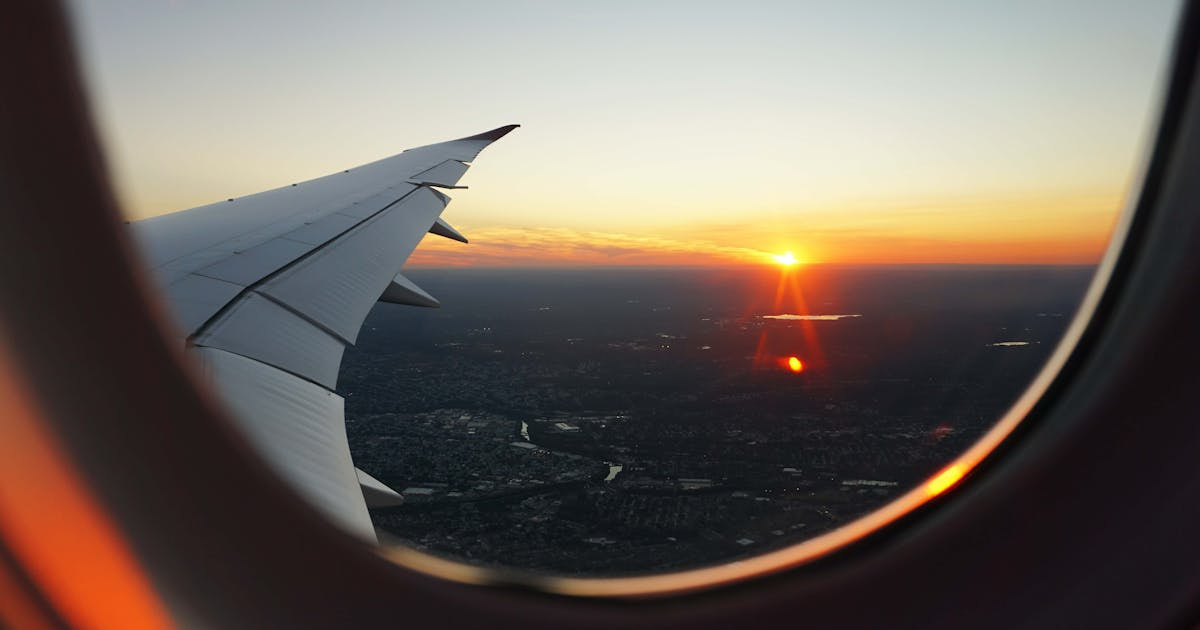
Thailand Visa For Indians: How To Get A Thailand Visa
Last Updated : 26 Apr 2024
30 Second summary
To apply for a Thailand visa, Indians have two options depending on the purpose and duration of their visit. For tourism trips shorter than 15 days Indians can apply for the Thailand Visa On Arrival online. For other purposes or trips exceeding 30 days, they must apply at a Thai Embassy or Consulate.
Alternatively, Indians can apply online through platforms like Atlys. This guide will discuss all visas available such as Thailand eVisa, Tourist visa, Multiple Entry visa, Business visa, Work visa, Golden visa, Student visa and Dependent visa.
The visa costs, processing times and application process will differ depending on the type of visa you applied for. Look at your eligibility criteria for each visa and remember to track your visa status after your application is submitted.
Welcome to the ultimate guide to the Thailand Visa for Indians. If you're traveling to Thailand from India, this post is for you!
In this guide, we'll discuss everything you want and need to know about Thailand Visas. This includes key points like:
The types of visas
How to apply
How to check your visa status
Processing times
Costs and so much more
With that said, let's not waste any more time!
Chapter 1 - The Thailand Visa For Indians
In this section of the guide, I'll cover the basics of the Thailand Visa for Indians. We'll take a look at the most frequently asked questions Indian citizens tend to have when traveling to Thailand from India.
If you already know the basics, feel free to skip ahead to the next section of our in-depth guide.
The Easiest Way To Get Your Thailand eVisa For Indians!
Applying for Thailand eVisa for Indian citizens is a tiresome and frustrating process. However, With Atlys, you can apply for a visa in under 10 minutes.
Fortunately, Atlys is here to help you ease the eVisa application process. Here is what you can expect when you're using it:
You'll get a step-by-step guide throughout the application process.
Saves you the hassles of gathering documents.
Get real-time notifications after you've applied; you won't miss out on your Evisa application status.
Overview Of Visa For Thailand
Let's take a look at a quick overview of the visa for Thailand. If you're traveling to Thailand from India, you need to know the following:
Do I Need A Visa To Go To Thailand From India?
Yes. Indian citizens visiting Thailand need a visa to enter. This means that you must apply for a visa before you travel.
There are different types of visas you can apply for. The visa you apply for depends on your purpose of visit, but we'll talk about that later on. If you're visiting for tourism purposes, you can get a Thailand Visa on Arrival or a Tourist Visa.
What Is The Thailand Visa, And Why Do I Need It?
A Thailand Tourist Visa is a stamp or document placed in your passport. It is needed to enter Thailand for tourism. A visa is a requirement for Indian citizens who wish to travel to Thailand; without a visa, you won't be allowed to enter Thailand.
Can I Apply For A Thailand Visa On Arrival 2022?
Yes! Indian citizens are eligible for a Visa On Arrival (VOA), which you can get at the international airport in the Kingdom of Thailand. However, if your stay in Thailand is longer than 15 days, you must apply for a Thailand Visa.
Is The Visa Application Process Easy For Indians?
Yes, it is. We'll discuss the visa process for Indian citizens next in this guide, and then you'll see it's nothing out of the ordinary. The documents are easy to obtain, and the application process is fairly straightforward.
How To Get A Visa For Thailand From India
You can get your visa by applying through the Thai Embassy or Consulate. I'll discuss how you can get your visa for Thailand in the next section.
Chapter 2 - How To Get A Thailand Visa
For the next part of this guide, I'll cover everything you need to know about the visa application process.
This section includes how to apply, the general documents you need, and why officials might reject your visa. If you already know everything you want to about the application process, feel free to skip to the next section of the guide.
How Can Indians Apply For The Thailand Visa?
There's a lot to cover with the application process, so let's break it down. We'll start with the following:
Where To Apply For A Thailand Visa?
If you travel to Thailand for tourism purposes and your trip is not longer than 15, you can apply for the Thailand Visa On Arrival online.
However, if you travel to Thailand for reasons other than tourism or your trip exceeds 15 days, you need to apply for a visa at a Thailand Embassy or Consulate.
You can also apply for your Visa online at Atlys or read our guide explaining the different ways to apply for a Thai visa.
How To Submit A Thailand Visa Application?
If you apply at a Thai Embassy or Consulate, you must first download the visa application form, print it out and complete it. Next, you take the application form with the other required documents and submit them at the Embassy or Consulate.
If you apply for a visa online, all you need to do is go to the website you use to apply, start the application and fill out the application form they provide. After that, you need to go through the rest of the application process, and at the very end, you can click to submit your application.
You can also apply for the eVisa on Atlys in 10 minutes.
Can I Make The Visa Application Online?
Yes, you can. However, you can only apply online through Atlys or a visa centre for an eVisa.
Visa Application Form 2022 For Indians
The next thing I'd like to cover is the visa forms. I'll discuss how you can complete the Thailand visa application form 2022.
Let's get to it!
How To Complete The Visa Form?
Completing the visa form is not complicated, but it's crucial to complete it correctly. Otherwise, officials will reject your visa.
The application form can vary depending on the Thai Embassy or Consulate, as they like to add the institution's name. However, the layout and request data are the same everywhere. Therefore, it is recommended to use the application form provided by the Thai embassy or consulate you apply at, as it will help you to avoid misunderstandings.
Completing the form:
When applying for a visa, you must submit your personal information and details about your visit.
In addition, on the top left of the application form, you must attach 2 passport-size photographs taken within the last 6 months (3.5 x 4.5 cm).
The visa application form PDF looks something like this:
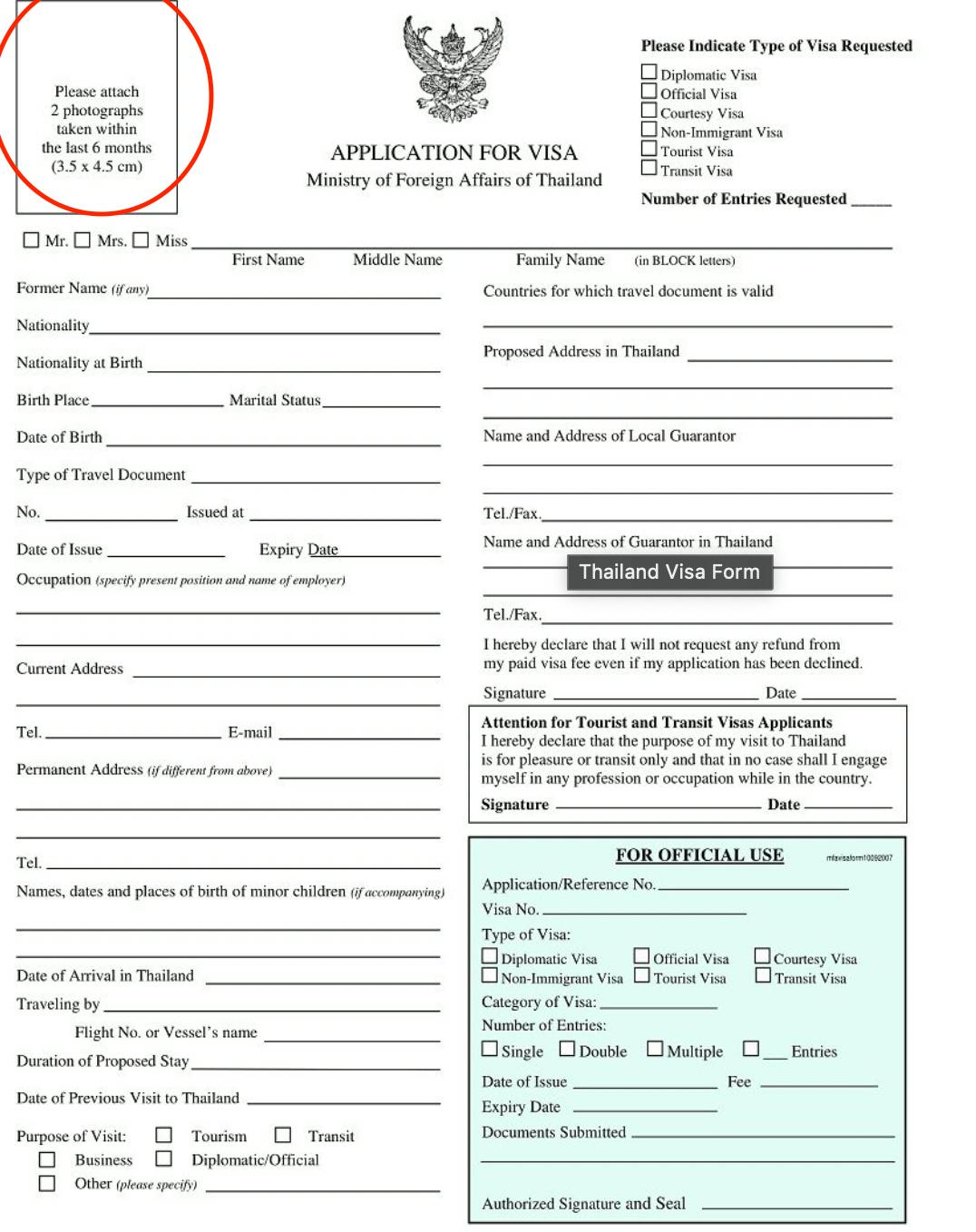
On the top right side of the visa application form PDF, tick the type of visa you're applying for - in most cases, it will be “Tourist Visa.” The number of entries requested should be 1 for a single-entry visa and 2 or more if you apply for a multiple-entry visa.
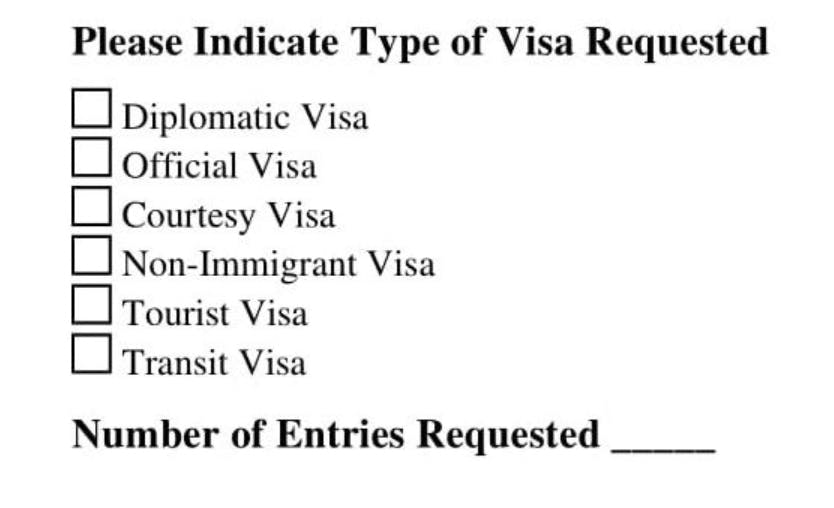
Then, you need to choose your status and tick the correct one. When it comes to your name, you need to write it in capital letters. Provide your first name, middle name, and family name.
For nationality, write the country's name as it is on your passport. If you have changed your nationality, provide information about your nationality at birth too. The birthplace is the city where you were born.
Name your marital status if you are married, divorced, or single. Finally, provide your date of birth.
Regarding writing dates, I recommend using a date format like in your passport – it will help you avoid misunderstandings.
The type of travel document should be a “passport,” as it’s mandatory for entering Thailand. Your passport number should be clear and exactly the same as your travel document.
The date and place of issue can be found on your passport and your passport’s expiry date.
In the occupation section, you must specify your present position and employer's name if you're unemployed. Double-check with the Embassy or Consulate, as they might ask you to provide extra documents proving that you have travel funds.
Provide your current address, phone number, and e-mail. A permanent address is your address in your home country and needs to be filled in only if it’s different from your current address.
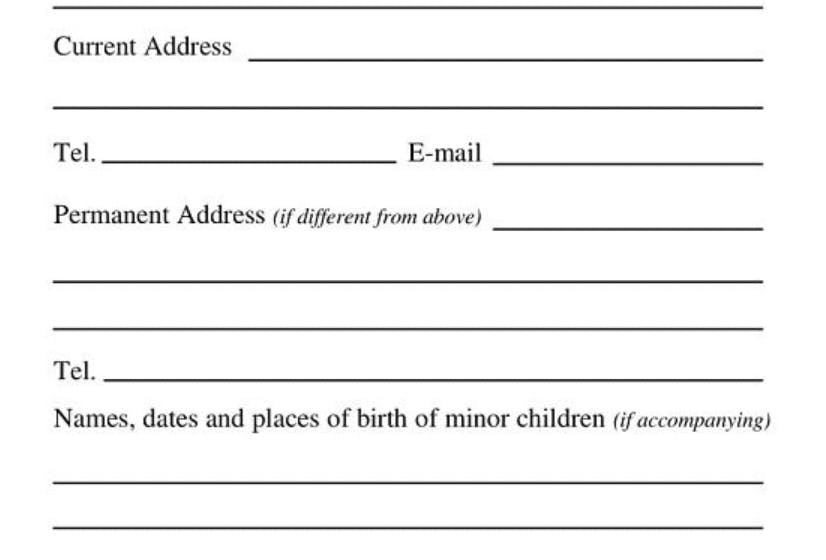
If you're traveling with minor children on the same passport, you must provide their names, last names, and birthdays in the designated area.
The date of arrival in Thailand should be the same as on your flight ticket, especially if you must submit proof of traveling with visa application documents. Your flight number must be filled with the details of your arrival flight, which can be easily found on your flight ticket.
When providing a proposed address in Thailand, be sure to give the name of your hotel and its address. Also, fill it with details from your accommodation booking confirmation, as the officers might check if your booking complies with the details provided on the visa application form.
The name and address of the local guarantor are the details of a contact person in your home country. For example, your family member or tour company representative should be if you're travelling on tour.
The name and Address of the Guarantor in Thailand normally can be left blank unless you will be stating that there will be a person who will provide accommodation for you or you will be applying for a Non-Immigrant Visa.
Don’t forget to sign the application form in two designated areas and write the current date nearby. You would be surprised how many people miss it!
What Are The Required Documents For The Thailand Visa?
There are certain documents you need to apply for your visa. These documents include the following:
A valid Indian passport or travel document with an expiry date of no less than 6 months.
A completed visa application form.
One recent photograph with a white background. You can use the Visa photo Tool on Atlys for this.
Round-trip air ticket or ticket to another destination.
Proof of financial means (10,000 baht per person/20,000 baht per family)
Proof of Hotel or private accommodation booking.
Remember that these are only the general documents you'll need. You might need additional documents depending on the type of visa you apply for.
What Are The Reasons For Thailand Visa Rejection?
This section covers everything you need and want to know about Thailand visa rejections. It's not very common but let's take a look at whether officials can deny your visa and why they would.
Can A Thailand Visa Be Rejected?
Unfortunately, yes. Suppose officials find any valid reason to deny your visa, they will. This is why you should make sure that you don't give them any reason to reject your visa.
We'll take a look at some reasons for visa rejection next.
Why Does A Visa Get Rejected?
To make sure your visa won't get rejected, you need to know why they would reject your visa. Some reasons for visa rejection are:
Financial Stability:
If you can't prove that you have enough funds to cover your stay in Thailand, officials will immediately reject your visa application. There is a financial requirement of showing a fixed amount of money in your account, USD 700 per individual or USD 1400 per family for Thailand.
Selecting The Wrong Visa Category:
If you apply for the wrong visa, your visa will also be rejected. So you must make sure you apply for the right type of visa. I'll discuss the types of Thailand visas in depth in the next section.
Validity Of Your Passport:
This is another common reason for visa rejection. Your passport must be valid for 6 months from the date of your travels and must have at least two blank pages. If your passport isn't valid when you apply, officials can reject your visa.
Overstay Of A Previous A Previous Visa:
When you submit your application, officials will check your travel history. If you overstayed a visa or violated any visa conditions in the past, officials will immediately reject your visa. This might also result in a permanent ban from entering the country.
Criminal Record:
The final reason for visa rejection is if you have a criminal record. This will result in the immediate rejection of your visa.
Chapter 3 - Types of Thailand Visa for Indians
As I've mentioned before, there are different types of visas you can apply for. In this part of the guide, we'll take a look at the different types of visas, how you can apply, and the required documents. You can jump to the next section if you want to skip this part.
Thailand eVisa
Thailand Tourist Visa
Thailand Multiple Entry Visa
Thailand Business Visa
Thailand Work Visa
Thailand Golden Visa
Thailand Student Visa
Thailand Dependent Visa
Thailand eVisa
Let's take a look at everything you need to know about the Thailand eVisa for Indian citizens. This section covers:
What Is The Thailand eVisa?
The Thai TeVisa is a single-entry electronic visa that allows you to stay in Thailand for up to 60 days and stays valid for either 3 or 6 months from issue.
You can use the electronic visa for Thailand for all tourism-related purposes, including family visits, medical treatment, participation in meetings, conventions, exhibitions, or incentives.
Thailand officially implemented a new stickerless eVisa system on the 26th of September, 2021, to ease the process of obtaining a visa before you visit Thailand.
Citizens of 37 eligible countries can submit their Thai eVisa applications online 15 business days before the planned departure to Thailand to receive the approved document via email in PDF form.
To skip the hassle, you can apply for the Thailand eVisa for Indians with Atlys and get your visa effortlessly.
Can Indians Get A Thailand eVisa?
Yes, you can. You can apply for your Thailand eVisa through the Atlys portal or a visa centre.
How To Get A Thailand eVisa Through Atlys?
Atlys streamlines the application process, which means that you can apply for your visa within a blink of an eye. The application process on the app looks like this:
Visit the online Atlys portal
First, go to the Atlys website and simply select Thailand as your travel destination and enter your travel dates.
Complete The Application Form
Next, you must provide personal details and travel detail to complete the visa application form.
Upload The Required Documents
Then, you must scan your passport page and take a passport-size photo of yourself. Atlys has a built-in feature to ensure your photo's meet the exact photo requirements.
Review Your Application
Review your visa application. It's important that you ensure all the information and documents are correct. If you provide false or incorrect information, officials can deny your visa.
Pay The Visa Fee
Lastly, you must pay the visa fee and submit your visa application. You can pay the visa fee online through the app. Then all you have to do is wait for them to process your visa!
What Documents Are Required?
Like with every visa, you need certain travel documents for your application. These documents are crucial for your application. If you forget a document, officials can reject your application. You'll need the following:
A passport with a validity of at least 6 months from your date of travel.
A recent passport-size photo with a white background.
Proof of a flight and return flight ticket.
Proof of accommodation in Thailand.
With Atlys, it's easy to make sure that all the documents are in digital format.
What Is The Visa Validity?
The validity of a Thailand eVisa is between 3-6 months, and you can stay for a maximum of 60 days.
What Is The Visa Cost?
The cost for the Thailand eVisa is 2600 Baht. The price is the same for all eligible nationalities. However, these costs can change, so I recommend you check the costs before applying.
Thailand Tourist Visa
Next, let's take a look at the Thailand Tourist Visa.
What Is The Thailand Tourist Visa?
A Thailand Tourist Visa is a stamp or document placed in your passport. It is needed to enter Thailand for tourism.
You can only apply for a Tourist Visa at the Thai Embassy or Consulate. However, you can extend your tourist visa in Thailand if you want to stay longer. The tourist visa should not be confused with the Visa Exemption stamp issued at the airport.
What Is The Process Of The Thailand Tourist Visa?
The visa process is fairly straightforward. First, you need to gather all the required documents. Then you must go to your nearest Embassy or Consulate to submit your application and pay the visa fee.
Now I know this is only a brief section on the process, but don't worry. For the next part of the section, I'll discuss each step of the process in depth.
What Documents Are Required?
You must understand all the visa requirements and gather all the required documents before you can begin applying for a Thailand visa.
These documents are crucial for your visa application. If you forget a document, officials can reject your visa. The documents you need to submit when applying for your visa are as follows:
A valid passport for at least 6 months with at least two blank pages.
A completed Thai visa application form. You must check the Thai embassy within your jurisdiction and use their visa application form.
Two recent passport-sized photographs with a white background.
Your return flight ticket (paid and confirmed).
Proof of accommodation in Thailand, such as hotel booking.
Proof of travel or a travel itinerary.
Proof of sufficient funds such as bank statements and payslips.
Proof of residence in India.
Remember that the Thai Embassy or Consulate you apply to can ask for additional documents.
How To Get A Thailand Tourist Visa?
Now let's take a look at the application process:
1. Contact your nearest Thai Embassy or Consulate:
You first need to contact the Thai Embassy or Consulate closest to you. You can find their contact information on their official website.
Once you contact them, you need to schedule an appointment, and this is also your chance to get information on anything you're uncertain about. For example, it would be wise to ask them if you should pay the visa fee with cash or a card.
2. Gather the documents:
Now that your visa appointment is scheduled, it's on to the next step. Remember those documents I mentioned before? This is where you'll need them. You need to ensure you have all the documents you need and that everything is up to date.
Travel Tip: Create a checklist for all the documents you need, grab a file, and check each document off the list as you put them in the file.
3. Go to your appointment:
Next, you need to go to the Thai Embassy or Consulate on the day of your scheduled appointment. When you arrive, you need to do three things:
Submit your documents.
Pay the visa fee.
Attend your interview (if applicable).
I added "if applicable" to the last thing because you might not even need to attend an interview.
4. Wait for your visa:
The last thing you must do is wait for the Embassy or Consulate to process your visa. Once you submit a complete application at the Embassy, the processing time for your visa is around 5 to 15 business days.
The Embassy will email you when they processed your visa application. Then all you need to do is go to the Embassy and pick up your passport with your visa.
What Is The Validity Of The Thailand Tourist Visa?
The validity of each visa will be different. Let us look at the validity of each specific visa for Indian citizens:
The Single Entry Visa for Indians allows a single entry for a stay period of 60 days and is valid for 3 months from the date of issue.
The Multiple Entry Visa for Indians allows multiple entries for a stay period of 60 days and is valid for 6 months from the date of issue.
The Special Tourist Visa for Indians allows a stay of 90 days in the country, and you can extend the visa twice. This visa type has been extended until 30 September 2022 and will be phased out.
Thailand Multiple Entry Visa
Another type of visa is the Thailand multiple-entry visa. This section covers everything you need to know:
What Is The Thailand Multiple Entry Visa For Indians?
The Thailand Multiple Entry Visa is available for everyone. This visa allows you to enter the country more than once. With a single entry visa, once you exit the country, you must apply for another visa before entering again.
However, a multiple-entry visa allows you to exit the country and reenter without applying for another visa.
This visa is only issued if you wish to travel to Thailand for tourism and leisure.
What Documents Are Required For A Thailand Multiple Entry Visa?
A valid passport or travel document. Your passport or travel document must not expire within 6 months and contain at least one blank visa page.
A visa application form completed and signed.
Two passport-size photographs with a white background. Photographs must have a full-face view of the person without wearing a hat or dark glasses and covering up shoulders. The photo must be taken within 6 months.
A copy of flight confirmation.
A copy of your bank statement for the last 6 months.
Hotel reservation confirmation.
A letter of proof of employment.
For students, full-time student status proof.
For self-employed, business license, or business registration.
For minors under 20 years old, you need a notarized copy of a birth certificate, a copy of the marriage certificate, a notarized copy of the original passports or ID of the mother and father/ legal guardian, and the original letter of notarized consent for the minor to travel abroad from mother and father/ legal guardian.
All supporting materials not in English must be accompanied by certified English translations and certified by an embassy only.
How To Get A Thailand Multiple Entry Visa?
The process of getting a Thailand multiple entry visa is the same as for a Thailand Tourist visa. First, you need to gather all the required documents I've listed above. Then, you need to call your nearest Thai Embassy and Consulate to schedule an appointment.
After you schedule your appointment, you must go to the Embassy on the day of your appointment, submit your application, and pay the visa fee. You might have to attend an interview, but don't worry, they'll only ask you questions about your travels.
The final step is to wait for the Embassy to process your visa application. Then, the Embassy will let you know via email when you can pick up your passport with the visa attached. It takes about 5 business days to process the visa.
What Is The Validity Of A Thailand Multiple Entry Visa?
The multiple-entry visa is valid for 6 months and allows you to leave and re-enter the country multiple times for the duration the visa is issued.
What Is The Cost Of A Thailand Multiple Entry Visa?
The cost for this visa is INR 12000. However, these costs can change, so I recommend you check the visa fees before applying.
Thailand Business Visa
This is another type of visa you can apply for. Remember to make sure the visa you apply for matches your purpose of travel. Let's take a look at what you need to know about this visa:
What Is The Thailand Business Visa?
Foreign nationals who travel to Thailand for business-related purposes must apply for a Thailand Business Visa. The Business Visa is a “B” Category of Thai Non-Immigrant Visas. You can apply for the Thailand Business Visa if you travel for the following reasons:
To conduct business without payment.
Paid employment, for which you will also need a Work Permit.
To invest in a business in Thailand.
What Is The Process Of A Thailand Business Visa?
You must apply for a Business Visa at a Thai Embassy or Consulate. First, you need to gather all the documents you'll need for your application; once you have all these documents, you're ready to submit your application.
This is just an overview of the application process. Next, we'll take an in-depth look at the required documents, the application process, and the costs of the Business Visa.
What Documents Are Required For A Thailand Business Visa?
You need certain travel documents before you can start the application process. These documents are crucial for your application. If you submit the wrong document or you forget to submit a document, officials can reject your visa. The documents you need are:
Your passport, which is valid for at least another six months and has at least two blank visa pages.
A completed and signed Thailand Business Visa application form. You can download the application form from the official website of the Embassy you apply at.
A passport-sized picture of yourself. Your photograph must be 3.5 cm x 4.5 cm with a white background. You also need to make sure that the photo has been taken within the last six months. You must have a neutral facial expression, staring straight ahead. Your entire face must be fully visible
Proof of sufficient financial means to cover the duration of your stay. You need 20,000 Thai Baht if you are traveling alone and 40,000 Thai Baht if you are traveling as a family.
A letter from your employer. Which states your position, how long you have been employed, your salary, and why you’re visiting Thailand.
A Letter of invitation from the company in Thailand.
Documents related to the inviting company in Thailand are signed by the Company’s Board of Directors, authorized managing director, and the company's seal.
If you are unsure of how to go about with your passport photo, Atlys’s photo tool is here to help.
How To Get A Thailand Business Visa
Now let's take a look at the application process for the Thailand Tourist Visa.
1. Contact your nearest Thai Embassy or Consulate:
You first need to contact the Thai Embassy or Consulate closest to you. You can find their contact information on their official website.
Once you contact them, you need to schedule an appointment, and this is also your chance to get information on anything you're uncertain about. For example, it would be wise to ask them if you should pay the Thailand Business Visa fee with cash or a card.
2. Gather the documents:
Now that your visa appointment is scheduled, it's on to the next step. Remember those documents I mentioned before? This is where you'll need them. You need to ensure you have all the documents you need and that everything is up to date.
Travel Tip: Create a checklist for all the documents you need, grab a file, and check each document off the list as you put them in the file.
3. Go to your appointment:
Next, you need to go to the Thai Embassy or Consulate on the day of your scheduled appointment. When you arrive, you need to do three things:
Submit your documents.
Pay the visa fee.
Attend your interview (if applicable).
I added "if applicable" to the last thing because you might not even need to attend an interview. But if you do, don't worry. During the interview, they'll only ask you questions to find out more about your travels to Thailand.
4. Wait for your visa:
The last thing you need to do is wait for the Embassy or Consulate to process your Thailand Tourist Visa. Once you submit a complete Thailand Business Visa application at the Embassy, the processing time for your visa is around 5-10 business days.
The Embassy will email you when they processed your visa application. Then all you need to do is go to the Embassy and pick up your passport with your visa.
What Is The Validity Of The Thailand Business Visa?
The Thailand Business Visa is valid for 90 days after you receive your visa. You can also extend this visa if you need to stay in Thailand longer.
What Is The Cost Of A Thailand Business Visa?
The Thai Business Visa cost depends on the visa type you apply for. The costs for the different types of visas are as follows:
Single-entry Thailand Business Visa fee is 2,000 Thai Baht.
Multiple-entry Thailand Business Visa fee is 5,000 Thai Baht.
The visa price for Indians could change slightly from one country to the next based on the local currency.
Thailand Work Visa
Next, I'll cover everything you need to know about the Thailand Work visa:
What Is The Thailand Work Visa?
A Thailand Work Visa is a Category “B” of Thailand Non-Immigrant Visas, which you must apply for when you enter Thailand to work.
Even though the Thailand Work Visa is issued for work purposes, you cannot work with just the visa. To be allowed to live and work in Thailand, you must get a Work Permit and an extension of stay once you enter the country.
What Is The Process Of The Thailand Work Visa?
You must apply for a Thailand Work Visa from one of the diplomatic mission offices of Thailand (an Embassy or Consulate) in your country or a neighboring country before you travel.
So first, you need to contact the Thailand Embassy or Consulate where you'll submit the application or visit their website if one is available. Then you can submit the documents and visa application on the day of your scheduled appointment.
Lastly, you need to wait for the Embassy to process your visa.
If your Thailand Work Visa is approved, you must enter the country within the time stated on your visa. Otherwise, it will expire.
As with the previous section, this is just a short version of the application process. I'll discuss everything in depth next.
What Documents Are Required For A Thailand Work Visa?
Before applying for a Thailand Work Visa, you must gather certain documents. These documents include the following:
A valid passport.
A filled-out and signed visa application form.
Recent passport-size photographs with a white background.
Professional testimonials.
All academic qualifications.
Certificates or licenses held by the applicant
A medical certificate.
Letter of employment.
Proof of address in Thailand.
A copy of additional licenses, if required.
In case you're married to a Thai national, you'll need your marriage certificate, your spouse’s identity card and household registration, and a copy of every page of your passport.
Your employer has to provide the following documents:
Company certificates and objectives.
List of shareholders.
Application of VAT.
Financial statement.
Employment agreement.
Letter of employment stating the position and salary of the applicant.
Social security payment filing.
How To Get A Thailand Work Visa
Now let's take a look at the application process for the Thailand Work Visa.
1. Contact your nearest Thai Embassy or Consulate:
You first need to contact the Thai Embassy or Consulate closest to you. You can find their contact information on their official website.
Once you contact them, you need to schedule an appointment, and this is also your chance to get information on anything you're uncertain about. For example, it would be wise to ask them if you should pay the Thailand Work Visa fee with cash or a card.
2. Gather the documents:
Now that your visa appointment is scheduled, it's on to the next step. Remember those documents I mentioned before? This is where you'll need them. You need to ensure you have all the documents you need and that everything is up to date.
Travel Tip: Create a checklist for all the documents you need, grab a file, and check each document off the list as you put them in the file.
3. Go to your appointment:
Next, you need to go to the Thai Embassy or Consulate on the day of your scheduled appointment. When you arrive, you need to do three things:
Submit your documents.
Pay the visa fee.
Attend your interview (if applicable).
I added "if applicable" to the last thing because you might not even need to attend an interview.
4. Wait for your visa:
The last thing you need to do is wait for the Embassy or Consulate to process your Thailand Work Visa. Once you submit a complete visa application at the Embassy, the processing time for your visa is around 5 to 15 business days.
The Embassy will email you when they process your visa application. Then all you need to do is go to the Embassy and pick up your passport with your visa.
What Is The Validity Of The Thailand Work Visa?
A Thai Work Permit is issued for a maximum duration of 1 year. Therefore, if your work contract is for a period of less than one year, your work permit will also be issued for that duration.
What Is The Cost Of A Thailand Work Visa?
The work visa cost depends on the type of visa you apply for (single entry or multiple entries). The fee for a Thailand Work Visa is as follows:
Single-entry Thailand Work Visa fee is 2,000 Thai Baht.
Multiple-entry Thailand Work Visa fee is 5,000 Thai Baht.
Thailand Golden Visa
Next, I'll discuss the Thailand Golden Visa. We'll take a look at the process, required documents, validity, and costs.
What Is A Thailand Golden Visa?
The Thailand Golden Visa is also known as the residency by investment program. This visa is offered to people for a 20-year residency in the country and access to privileges.
To apply for the Thai Golden Visa, you'll need an investment of at least 1,000,000 Baht through the Thai Elite banking programs. In addition, this visa entails a lot of privileges like:
Freedom to live in Thailand for 20 years.
Freedom to work in Thailand without a work permit.
Freedom to own real estate in Thailand.
What Is The Process Of The Thailand Golden Visa?
The process of the Golden Visa can be intimidating, but I'll get you through it. The best thing about the Golden Visa application is that you can apply online. During the application, you must provide personal information and submit certain documents.
Let's take a look at everything in depth.
What Documents Are Required For A Thailand Golden Visa?
The requirements of documents are straightforward. The documents required are:
A copy of the profile page of your passport.
The original and the copy of the acquired elite visa application form.
A passport-size photograph with a white background.
How To Get A Thailand Golden Visa?
The application process for this visa is the same as for any other visa. Let's take a look at the process.
1. Contact your nearest Thai Embassy or Consulate:
You first need to contact the Thai Embassy or Consulate closest to you. You can find their contact information on their official website.
Once you contact them, you need to schedule an appointment, and this is also your chance to get information on anything you're uncertain about. For example, it would be wise to ask them if you should pay the visa fee with cash or a card. The Embassy also provides certain visa services you can find out about.
2. Gather the documents:
Now that your visa appointment is scheduled, it's on to the next step. Remember those documents I mentioned before? This is where you'll need them. You need to ensure you have all the documents you need and that everything is up to date.
3. Go to your appointment:
Next, you need to go to the Thai Embassy or Consulate on the day of your scheduled appointment. When you arrive, you need to do three things:
Submit your documents.
Pay the visa fee.
Attend your interview (if applicable).
I added "if applicable" to the last thing because you might not even need to attend an interview.
4. Wait for your visa:
The last thing you need to do is wait for the Embassy or Consulate to process your Thailand Golden Visa. Once you submit a complete visa application at the Embassy, the processing time for your visa is around 5 to 15 business days.
The Embassy will email you when they process your visa application. Then all you need to do is go to the Embassy and pick up your passport with your visa.
What Is The Validity Of The Thailand Golden Visa?
Thailand’s residency by investment program or Thai golden visa allows foreigners to live in the country for up to 20 years.
What Is The Cost Of The Thailand Golden Visa?
The fee is approximately 30,000 USD per the main applicant and another 22,500 USD for each dependent.
Dependents can include parents, step-parents, spouses (civil union included), children, and stepchildren. There is no age limit and no annual fee. Unfortunately, a residence visa cannot be transferred.
Thailand Student Visa
The Thailand Student Visa is another visa you can apply for. Before you apply for this visa, you need to know more about the visa. In this section, we'll take a look at everything you need to know about the Thailand Student Visa. This includes the application process, documents, costs, and validity.
What Is The Thailand Student Visa?
The Thailand Student Visa is a Non-Immigrant Thai Visa. This visa is issued to foreigners traveling to Thailand for reasons other than tourism and is categorized based on the purpose of travel.
To qualify for a Thai Student Visa, you have to:
Be enrolled in a Thai educational institution.
Take at least three courses.
Have at least 15 hours of classes per week.
What Is The Process Of The Thailand Student Visa?
Unfortunately, you can't apply for a Student Visa online. This means that you have to go to a Thai Embassy or Consulate and apply in person. The process for the Thailand Student Visa looks like this:
You need to make an appointment at the Thai Embassy or Consulate. After that, you need to gather all the required documents and complete the visa application form. Next, you must go to the Thai Embassy or Consulate on the day of your appointment, pay the visa fee, and submit your visa application.
What Documents Are Required For A Thailand Student Visa?
Like with every other visa, you need certain documents for your application. The documents you need for the Thailand Student Visa are as follows:
Your passport with a validity of not less than 6 months.
A completed visa application form.
2 passport-sized (4 x 6 cm) recent passport-size photos.
Recommendation letter.
Letter of acceptance from the institute or organization (school or university).
Student ID and Academic records (if currently studying).
Additional documents as deemed necessary.
How To Get A Thailand Student Visa?
1. Visit the Embassy or Consulate:
To apply for a Student Visa, you must make your application at a Thai Embassy or Consulate. Therefore, make sure you contact the Embassy or Consulate and schedule an appointment to submit your visa application.
To make your application, you will first need to be enrolled in a recognized full-time education course that meets all the visa requirements, and you must have paid at least 50% of the total course costs or the full amount of the course.
Once you have enrolled, the school or institution will need to provide you with all the necessary paperwork to make your application. In some cases, it may be possible for the school to mail the paperwork directly to the Royal Thai Embassy or Consulate to which you are applying.
2. Attend a visa appointment:
After everything is in order, you must gather all your documents and show up for your appointment at the Thai Embassy or Consulate. You must submit your application and pay your visa fee when you get there.
You should also know that you might have to attend an interview. Don't worry, though. Officials will only ask you questions to find out more about your travels.
3. Wait for your visa:
Lastly, you just have to wait for the Embassy to process your visa application. Applications for a Student visa usually take around 4-5 business days. After that, the Embassy will let you know via email when you can pick up your passport with your visa.
What Is The Validity Of The Thailand Student Visa?
A Thailand Student Visa is valid for a maximum of 90 days for a single entry or multiple entries. So even though your study course is likely for at least one year, you’ll still get a 90-day visa.
However, before your visa is up, you can apply to extend it at the Thailand Immigration Department for a fee of 1,900 Thai Baht.
You have to extend it every 90 days before the expiry of the existing visa.
What Is The Cost Of A Thailand Student Visa?
The fee for a Thailand Student Visa is 2,000 Thai Baht. However, the fee can change slightly depending on the local currency and the embassy you apply to.
The Thailand Student Visa fee payment method also changes depending on where you apply. For example, some Embassies or Consulates may require the fee is paid in cash, while others can ask you to pay it through bank order.
Thailand Dependent Visa
I know I'm talking a lot about the different visas you can apply for. This is just because you need to apply for the visa that suits your purpose of travel best.
Next is the Dependent Visa, so let's see what it has in store.
What Is The Thailand Dependent Visa?
The Dependent Visa is specifically designed for family members of foreigners working in Thailand. For anyone searching for a family visa in Thailand, this is the ideal solution if they wish to remain in the Kingdom for more than 30 days.
A tourist visa or a 30-day exempt stamp would be sufficient for those looking to visit relatives.
Now I know you're asking, "Who is eligible for a Family Visa for Thailand?" Well, let me tell you!
This visa is available to family members of a person working in Thailand or a spouse of a Thai National. In most cases, working expatriates include their wives, children, and step-children.
What Is The Process Of The Thailand Dependent Visa?
The application process can be quite complex but don't worry. I got you. Almost all company documents are in Thai, so knowing which are required can be quite challenging.
Typically, applications for the first 90-day visa (outside Thailand) can be submitted online or in person, with payments made in your local currency. After that, the process usually takes between 5 and 10 days.
Applications in your “home” country are more straightforward, but if you require a one-year visa, you must visit the Thai Immigration office at Chaeng Wattana in Bangkok. You will need to take a complete set of paperwork, and you will need to answer any questions posed by the immigration official.
What Documents Are Required For A Thailand Dependent Visa?
As you know from reading this guide, travel documents are very important for your application. To apply for a family visa to Thailand, you will need the following documents:
A valid passport with at least six months remaining and two spare pages.
A copy of the working partner’s passport, including visa, visa stamps, and departure card.
A copy of the working partner’s work permit.
Copies of the employer’s company paperwork.
One passport-size photograph 4x6cm.
Evidence of the relationship of the dependent/spouse to the working partner.
How To Get A Thailand Dependent Visa?
The application process for the Dependent Visa is fairly straightforward. If you follow my guide, you'll apply for your visa in no time.
1. Contact your nearest Thai Embassy or Consulate:
You first need to contact the Thai Embassy or Consulate closest to you. You can find their contact information on their official website.
Once you contact them, you need to schedule an appointment, and this is also your chance to get information on anything you're uncertain about. For example, it would be wise to ask them if you should pay the visa fee with cash or a card.
2. Gather the documents:
Now that your visa appointment is scheduled, it's on to the next step. Remember those documents I mentioned before? This is where you'll need them. You need to ensure you have all the documents you need and that everything is up to date.
3. Go to your appointment:
Next, you need to go to the Thai Embassy or Consulate on the day of your scheduled appointment. When you arrive, you need to do three things:
Submit your documents.
Pay the visa fee.
Attend your interview (if applicable).
I added "if applicable" to the last thing because you might not even need to attend an interview.
4. Wait for your visa:
The last thing you must do is wait for the Embassy or Consulate to process your visa. Once you submit a complete visa application at the Embassy, the processing time for your visa is around 5 to 15 business days.
The Embassy will email you when they process your visa application. Then all you need to do is go to the Embassy and pick up your passport with your visa.
What Is The Validity Of The Thailand Dependent Visa?
If you apply for a visa outside of Thailand, the visa will be valid for up to 90 days. You can extend the visa for an additional seven days at the discretion of the Thai Immigration Department.
If the visa is applied for in Thailand, it will be valid for up to one year. The visas are single-entry in both cases. However, for the one-year visa, getting a re-entry permit allows you to leave and re-enter Thailand on the same visa.
What Is The Cost Of The Thailand Dependent Visa?
The cost for a Thailand Dependent Visa is 5,000 INR. However, these costs are subject to change, so I recommend you check the costs before applying.
Other Types of Thailand Visas for Indians
The visas mentioned above are just the tip of the iceberg. There are other types of visas you can apply for.
Thailand Permanent Resident
Obtaining status as a Permanent Resident (PR) in Thailand has many advantages. It allows you to live permanently in Thailand with no requirement to apply for an extended stay. You can also have your name on a house registration document, and you will be able to buy a condominium without making a bank transfer from abroad. Getting a work permit is also made easier once you have PR status.
Chapter 4 - Eligibility Criteria for Indians
Now let's take a look at the eligibility criteria for the Thailand visa for Indians. But, again, if you'd like to skip this section, you can just jump to the next one.
Thailand Visa Eligibility For Indians
The eligibility requirements are an important part. Therefore, before starting your application, you must make sure you meet all the eligibility requirements. To be eligible for a Thailand visa, you must meet the following requirements:
You must have an Indian holding a valid passport. The Passport should be valid for a minimum of six months with two blank pages.
You must provide proof of confirmed hotel reservation and return flight ticket and sufficient funds to cover your cost in Thailand.
Lastly, you must prove that you intend to leave Thailand at the end of your authorized stay.
How Much Bank Balance Is Required?
To enter Thailand, you must prove that you have enough money to support yourself during the trip. This is known as the financial requirements and forms part of the Thailand Visa documents. It's a standard requirement for most countries around the globe, including Indian citizens.
The Ministry of Foreign Affairs states that you must prove that you have a minimum of 20,000 Baht or around 43,000 INR per person. If you plan to travel with your family, you need a minimum of 40,000 Baht or 87,000 INR. You can provide recent bank statements, pay slips, or a sponsorship letter.
Who Is Eligible To Work In Thailand?
Anyone can work in Thailand. However, you need a Thailand Work Visa to enter, live, and work in Thailand.
Can I Move To Thailand Without A Job?
Yes and no. Many people move to Thailand on a tourist visa and then do visa runs.
Visa runs are when you leave Thailand before your visa expires and go to another country and apply for another Thailand Tourist Visa while you're there.
However, moving to Thailand without work permits or jobs is not above board.
Chapter 5 - Visa Requirements For Indians
In this chapter, we'll take a look at the requirements for a Thailand visa. Again, if this chapter doesn't pique your interest, go ahead and skip to the next section of the guide.
Visa Policy For Indians
In this section let us look at some of the visa policy for Thailand that Indians must be aware of.
Can I Apply For A Thailand Visa Myself?
Yes, you can! You can apply for a visa at a Thai Embassy or Consulate in person. You can also apply for the eVisa On Arrival online.
Even better, you can easily apply all by yourself through Atlys, where everything will be handled for you, so you don’t have to stress!
Read our specific guide to learn more about the difference between Thailand eVOA vs. VOA.
What Documents Do I Need To Enter Thailand?
The first thing you'll need is your valid passport. This is very important because, more often than not, Embassies attach the visa to your passport. Most importantly, you won't be able to enter or travel anywhere without a passport.
The second thing you'll need is your return flight ticket to show that you plan on leaving the country before your visa expires.
I would also recommend that you have proof of accommodation (hotel bookings) and proof of sufficient funds (bank statements) with you just in case officials ask for it.
How Long Can You Stay In Thailand Without A Visa?
The first thing you need to understand is that as an Indian citizen, you're not allowed to enter Thailand without a visa. In some countries, there is something known as a grace period.
A grace period is when the country gives you a couple of days after your visa expires to leave the country, which is almost like "staying without a visa." Unfortunately, Thailand doesn't offer a grace period. You can only travel to Thailand without a visa if you're a national of a visa-free country.
So to answer the question, you can't stay in Thailand without a visa.
What Are The Visa Photo Size Requirements For Thailand?
When you submit your passport-size photos, you must ensure they meet the requirements. The photo requirements are as follows:
The passport photo should be 2 inches x 2 inches for a passport and 60mm by 40mm for a visa.
The photo should be in color.
Head size and position: Head should take up 70-80% of the photo, centered and looking forward.
The photo must be recent (taken within the last six months).
Make sure your photo has a white background.
Keep a neutral expression with no teeth showing.
You can wear glasses only if they do not block your eyes.
Headgear is acceptable for religious or medical purposes.
Chapter 6 - Thailand Visa Process
I've covered a lot about this visa, but there is still a lot more we need to cover. So, for this section, we'll keep it short and sweet with the visa processing time.
I know I say this in every section, but I'm saying it again. You can skip this section if you already know what you need to know.
Visa Processing Time For Indians
One of the most common questions is,
"How long will it take to process my visa?"
We'll let's take a look at the processing times:
What Is The Thailand Tourist Visa Processing Time In India?
The processing time for the Tourist Visa is about 5 -10 working days, starting from the time that the Thai Embassy or Consulate receives your complete application.
Make sure you apply for your visa at least two weeks before your travels.
What Is The Thailand Work Permit Visa Processing Time In India?
The visa processing time for the work permit for Thailand is about 7 business days. This processing time begins when the Embassy receives your visa application.
The visa processing time does not include weekends or public holidays.
What Is The Thailand Student Visa Processing Time In India?
The processing time for a Thailand Student Visa depends on the Embassy or Consulate through which you apply. You should give it about 5 – 10 business days, although some offices claim to process your visa in as little as two days.
Chapter 7 - Visa Status
Suppose you applied for your visa, but now you want to check your visa status to stay on top of where your visa is. This is why I created this section. This section covers everything you need to know about checking your visa status.
How Can I Check My Visa Status Online?
Unfortunately, you can only check your visa status online if you apply through a visa agency.
If you apply for a visa for Thailand online through Atlys, you can check your visa status on the portal.
How To Check My Visa Status In India?
If you apply through a Thai Embassy or Consulate, you can check your visa status by contacting the Embassy. Their contact information is available on their official website.
If you apply through a visa agency, you can check your visa status online or by contacting them.
How To Check My Thailand Visa Status With A Passport Number
If you have applied online through a travel or visa agency, they would have the option for you to check your visa status online by passport number.
However, this depends on whether they offer the service of checking the status using a passport number.
Chapter 8 - Thailand Visa On Arrival
In this section, we'll take a look at the Visa On Arrival for Thailand. You can go ahead and skip to the next section of this guide if you know everything you want to know about the Thailand Visa On Arrival 2022.
Thailand Arrival Card vs. Visa
The Thailand Arrival Card is a document you need to complete before you arrive in Thailand. A Thailand Visa is what you need to enter Thailand.
However, for now, the arrival and departure card is suspended. The Thailand Visa is a document you need to enter Thailand. Without a visa, you won't be able to travel to and visit Thailand.
Does Thailand Provide An On Arrival Visa?
Yes, they do! Thailand offers a Visa on Arrival for 20 countries. I'll discuss whether or not Indian citizens can get a Visa On Arrival in Thailand next.
Can Indian Citizens Get A Visa On Arrival In Thailand?
Yes, you can! Fortunately, Indian citizens can apply for a Visa On Arrival. However, you can only apply for this visa if your trip is for tourism and does not exceed 15 days.
You should note that there are two types of Visas on Arrival. There is a normal Thailand Visa On Arrival and an Electronic Visa On Arrival (eVOA).
If you want to apply for the normal Visa on arrival, you can just download the form and complete it and then apply for your visa at the Immigration counter in Thailand.
If you apply for the eVOA, you must complete the Visa On Arrival online application form, print it, and take it with you. You can complete the online application form for a Visa On Arriva.
All you need to do to get a Visa On Arrival is to go to the immigration counter once you disembark from your flight in Thailand and apply for the visa. You'll need to provide the following documents:
A valid passport with two blank pages.
A passport-size photo.
Proof of a return flight ticket.
Proof of accommodation in Thailand.
Proof that you have enough funds to cover your trip, like bank statements.
You'll also have to pay a fee to receive your visa. Normally, the Thailand on arrival visa fee is 2,000 Thai Baht to be paid in cash in the Baht currency.
Chapter 9 - Thailand Visa Price for Indians
In this part of the guide, I'll discuss the visa fees. If you'd like to skip this part, you can jump to the next section of the guide.
Thailand Visa Fees According To The Type Of Visa for Indians
We'll take a look at the visa fees for different types of visas. You should know that the visa fees change depending on the visa you apply for.
How Much Is A Thailand Visa For Indians?
As mentioned above, the visa price for Indians differs for each type of visa you apply for. Let's take a look at the visa fee for each visa:
Thailand Tourist Visa: Single Entry visa for Indians costs 2,500 INR. If you apply for a Multiple Entry visa for Indians, you need to pay 12,000 INR.
Visa On Arrival 2022: This visa costs 4,600 INR.
Thailand Work Visa: The visa fee for the Single Entry Work Visa is 4,358 INR. If you apply for the Multiple Entry work Visa, you must pay 10,895 INR.
Thailand Business Visa: This visa costs 4,358 INR.
Thailand Student Visa: This visa costs 4,358 INR.
How To Pay The Visa Fees?
So this part is actually very straightforward. Once you get to the Thai Embassy on the day of your appointment, you can pay the visa fee there. Before you go to submit your application, pay the visa fee at the counter. You need to pay before you submit your application because you need proof of payment.
You can pay the fee in your local currency in cash or card, depending on the Embassy you apply to.
If you apply for the Thailand Visa On Arrival 2022, you can pay the visa fee once you land in Thailand. However, you need to pay the Visa On Arrival fee in cash when you apply for your visa at the airport in Thailand.
Chapter 10 - Thailand Free Visa: Countries That Qualify To Enter Thailand Without A Visa?
I've mentioned earlier in this post that the only way you can travel to and stay in Thailand without a visa is if you're a national from a visa-free country. In this section, we'll take a look at the countries that can travel to Thailand without a visa, and I'll also discuss the Transit Visa for Thailand.
List Of Countries That Are Eligible To Travel To Thailand Without A Visa
There are 64 countries on the Thailand visa-free list. So if you're a national from one of the following countries, you can travel to Thailand without a visa:
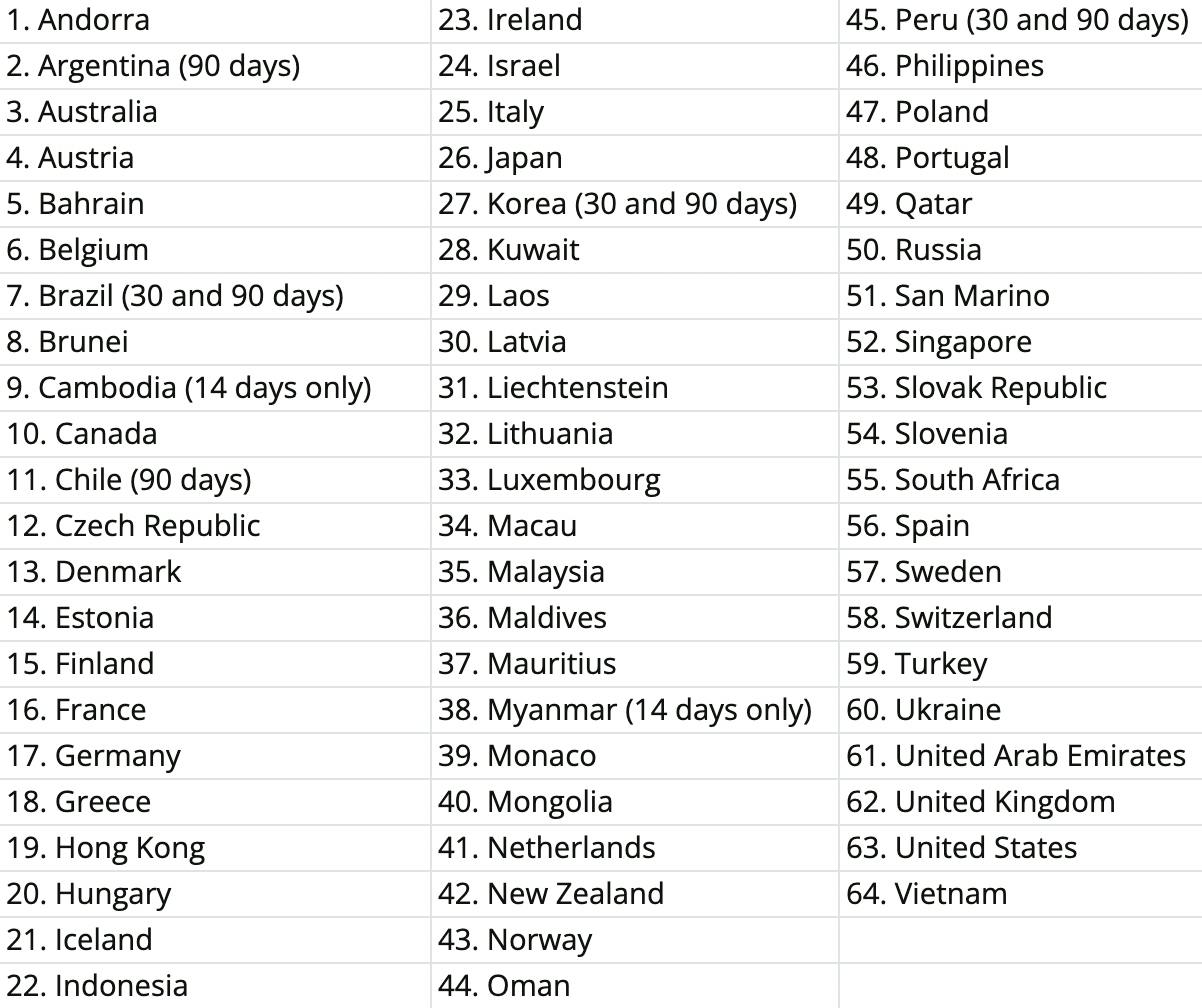
Do I Need A Visa To Transit Through Thailand?
If you spend more than 12 hours at the airport in Thailand, you need a Transit Visa. However, I recommend you contact the airline and an embassy or consulate of your destination country to verify this information.
Don't worry, though; I'll discuss the application process for the Transit Visa in depth.
How Do I Apply For A Visa-Free Transit Facility?
Suppose you checked if you need a Thailand Transit Visa, and you do; the next step is to apply for your Transit Visa. Then, all you need to do is follow the steps below.
1. Prepare your documents:
Before you apply, you need to gather the documents you'll need for the application. These documents are crucial for your application. If you forget one, officials can reject your visa. You'll need the following documents:
An airport transit visa application form.
Your passport with six-month validity and two blank pages.
Two passport-size photos.
Travel health insurance.
Travel ticket to your destination country.
Visa for your destination country (if required).
Financial evidence that you can support your trip.
Just a reminder that you might need additional documents depending on your transition country.
2. Find your nearest Embassy or Consulate:
You need to find a representative of your transit country, either an embassy, consulate, or visa application center. Once you find the visa office, make an appointment to attend your interview and submit your application.
It's very important that you make sure you have everything you need to submit your application. Before you submit your application, you need to pay the Transit visa fees. The fee is usually somewhere between INR 1988- INR 7953. However, several countries do not require an application fee for a Transit Visa.
3. Wait for them to process your visa:
After you submit your application, you just need to wait for officials to process your visa. The processing time for a Thailand Transit Visa depends on the Thai Embassy or Consulate you apply to. It can take 2 – 10 working days, but it may be even longer.
Chapter 11 - An Overview of the Thailand Embassy in India
The Thailand Embassies In India
There are different Thai Embassies in India you can use to apply for your visa.
How Many Thailand Embassy Offices Are There In India?
There are 4 Thailand Embassies in India. The list of Thailand Embassies in India is as follows:
Thailand Consulate in Kolkata, India:
ADDRESS: 18-B, Mandeville Gardens Ballygunge, Kolkata 700019, West Bengal, India.
CONTACT NUMBERS: +91 33 2440 9723, +91 33 2440 7836, +91 33 2440 3231, +91 33 2440 3229.
EMAIL: [email protected] or [email protected].
WORKING DAYS: Monday to Friday.WORKING HOURS: 09:00 am - 05:00 pm.
Thailand Embassy in Delhi, India:
ADDRESS: 56 N, Nyaya Marg, Chanakyapuri, South West Delhi 110021, Delhi, India.
CONTACT NUMBER: +91 11 4977 4100.
EMAIL: [email protected].
WORKING DAYS: Monday to Friday.WORKING HOURS: 09:00 am - 12:30 pm, 02:00 pm - 05:00 pm.
Thailand Consulate in Mumbai, India:
ADDRESS: Express Towers, 12th Floor, Barrister Rajni Patel Marg, Nariman Point, Mumbai 400021, Maharashtra, India.
CONTACT NUMBER: +91 22 2282 2061 or +91 22 2282 3535.
EMAIL: [email protected].
WORKING DAYS: Monday to Friday.WORKING HOURS: 09:30 am - 05:30 pm.
Thailand Consulate in Chennai, India:
ADDRESS: op to Novotel hotel, plot number 116, chamires, Road, Nandanam Extension, Chennai 600035, Tamil Nadu, India.
CONTACT NUMBER: +91 44 4230 0780.
EMAIL: [email protected].
WORKING DAYS: Monday to Friday.WORKING HOURS: 09:00 am - 01:00 pm, 02:00 pm - 05:00 pm
What Are The Responsibilities Of The Thailand Embassy?
The Embassies have certain responsibilities and services they provide to travelers. The responsibilities of the Embassies are listed as follows:
Represent Thailand as a country:
Improving the communication between both countries is how the Embassy represents the country of Thailand. Taking care of the political, economic, social, cultural, and defense issues, as well as any other matter of interest to Thailand, are other duties of the embassy.
Assisting the authorities from Thailand in visiting India:
The nation's government occasionally needs to travel to India for a specific purpose. So the embassy must help them enter the nation and with their needs while they're here.
Issuance of an Indian visa for Thailand:
The embassy has certain duties towards issuing visas for Indian citizens. These duties are:
Taking in applications: The Thailand embassy accepts visa applications made online or offline directly on the country embassy website. These can be tourist, employment, resident, or business visas.
Verification of the forms: The embassy verifies the information on the forms and examines its validity. The following process is then continued.
Attestation of documents: It is a part of the visa documentation process, which is done by obtaining a stamp from the Thai Embassy. There are other levels of document authentication before the Embassy attestation.
Conducting visa interviews: When necessary, the Thai Embassy conducts interviews with potential visa applicants. For the processing of visas, a specific department exists.
Helping Thailand citizens with their passport issues:
The Thailand embassy officials assist citizens from Thailand who is in India with passport-related issues.
-Lost passport affidavit: You must lodge an FIR complaint at the police station if your passport is lost. A lost passport must also be issued so the Embassy can help with the process.
Circulate a new passport: A temporary passport is sometimes issued by the embassy in case of a lost passport.
Consular help to the citizens of Thailand:
Assistance is provided to individuals of Thailand at the time of arrest or for any kind of judiciary reasons.
Attending to commercial and financial matters:
The Thai Embassy also takes care of the financial matters and business-related affairs that concern the government of Thailand.
How Do I Contact The Thailand Embassies In India?
You can contact the Thailand Embassies through the email they provide on their website or call them. Their contact number should also be available on the website.
Suppose you don't feel like searching for the contact detail of each Thailand Embassy. In that case, you can jump to an earlier section of the guide, where I discuss the address, email, and contact number of each Thai Embassy.
Chapter 12 - Apply For Your Thailand Visa Without Hassle
For the last section of this guide, we'll take a look at how passport holders can apply for a Thailand visa faster than ever. This section is for people looking for an easy way to apply without any hassle.
Apply For A Thailand Visa Online In Minutes With Atlys
Atlys takes care of everything, from your visa application to your visa appointment. The application process is easy, seamless, and fast.
Atlys also saves all your information which will make your next visa application even faster. In fact, Atlys holds the world record for the fastest visa application ever.
So what are you waiting for, give it a try and apply for a visa online using Atlys!
Where Can I Apply For The Thailand Visa For Indians?
With Atlys, you can just visit the website and apply it from the comfort of your own home. This means you don't have to go to an Embassy to apply or struggle with the e-Visa portal.
After visiting the portal or downloading the app, you just need to provide the country you're traveling to and your details, upload your documents, and pay the visa fees.
How Long Will It Take To Receive Confirmation For Visa Approval?
Even though Atlys offers a faster and easier way to apply for a visa to Thailand, the visa approval depends on how long the Embassy takes.
What Are Atlys' Thailand Visa Fees?
The visa cost is 5,550 INR if you apply through Atlys.
Key Points Of The Thailand Visa For Indians
Because this is the Thailand Visa COMPLETE guide and there's so much information, I'll quickly list key takeaways of the Thailand Visa for Indians.
Indian citizens must apply for a visa before traveling to Thailand.
You are eligible to apply for a Visa On Arrival for Thailand.
There are two types of visas on arrival. The first is the traditional Thailand Visa On Arrival and the second is the Thailand E Visa On Arrival.
Indian citizens can apply for an eVisa for Thailand through Atlys.
The eVisa is the easiest visa to apply for.
The visa costs and processing times differ depending on the visa you apply for.
Using Atlys is the easiest way to apply for your visa.
Your Thailand passport photo must meet the requirements.
All Done!
I know this guide has been hectic and long, but it truly has everything you need and wants to know about the Thailand Visa. Make sure you visit Phuket. It’s beautiful!
Frequently Asked Questions
Yes. Indian citizens must apply for permission to extend their visa at the Office of the Immigration Bureau. For an extension of stay, you need to apply at the following Immigration Bureau/Immigration Office:
Office of Immigration Bureau Government Center B Chaengwattana Soi 7, Laksi Bangkok 10210 Tel 0-2141-9889
Alternatively, you can lodge an application at the official website. Once you click on the link, follow the instructions provided by the Immigration Bureau.
Visas in Under a Week

Cyprus Visa for Indians: Requirement, Fees & How to Apply
Apr 26, 2024Cyprus visa for Indians
Learn how to secure a Cyprus visa for Indians, from booking a Schengen visa appointment, paying the fees, to in-person submission of the required documents.

Oman Visa for Indians: Online Visa Requirements & Fees
Apr 26, 2024Oman Visa for Indians
Check out our guide on the Oman visa for Indians and learn about the application process, fees, validity and more

How Indians Can Apply For A Dubai Visa
Apr 26, 2024How Indians Can Apply For A Dubai Visa
In this post, you will find how Indians can apply for their Dubai Visa. We will also cover different ways to apply for your Dubai Visa and the required documents.

Indonesia Visa for Indians: Online Visa Requirements & Fees
Apr 26, 2024Indonesia E-Visa for Indians
Learn about the visa requirements, fees, processing time, and visa validity. Follow our step-by-step guide to apply for an Indonesia visa for Indians.
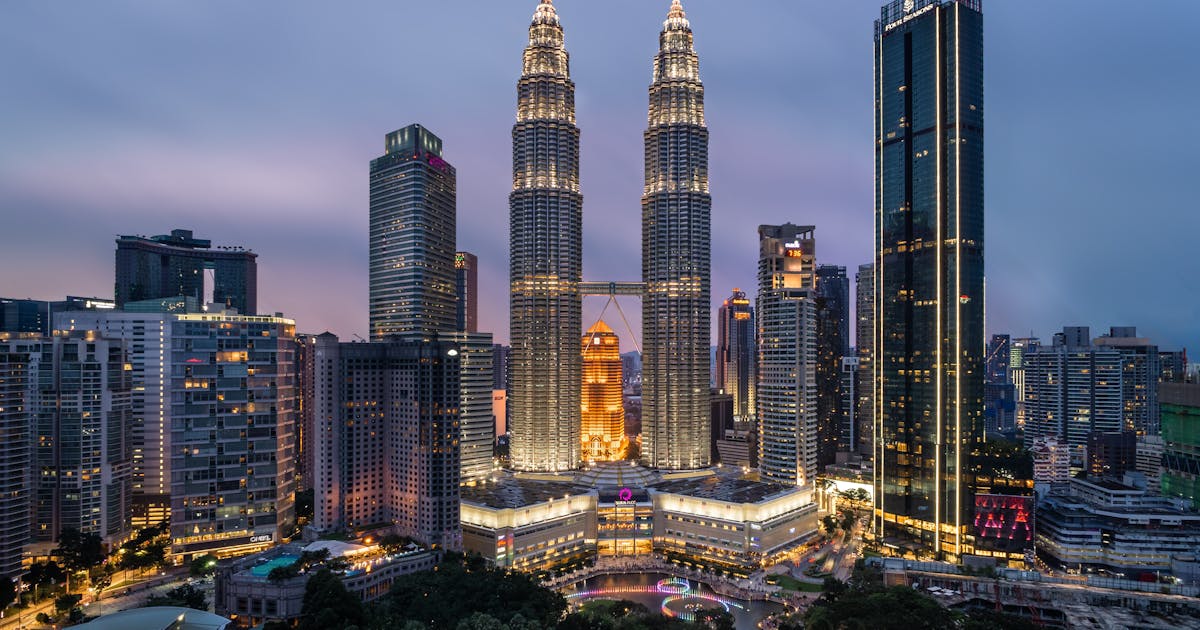
Malaysia Visa for Indians - New Visa Changes with MDAC
Apr 26, 2024Malaysia visa for Indians
Learn the new policy updates for the Malaysia visa for Indians. Our detailed guide includes the new visa regulations, requirements, and related fees.

Myanmar E-Visa for Indians: Online Visa Requirements & Fees
Apr 26, 2024Myanmar Visa For Indians
Know more about the essential steps to obtain Myanmar visa for Indians. Includes up-to-date info on requirements, fees, and application tips for Indian travellers.
Instant Visas
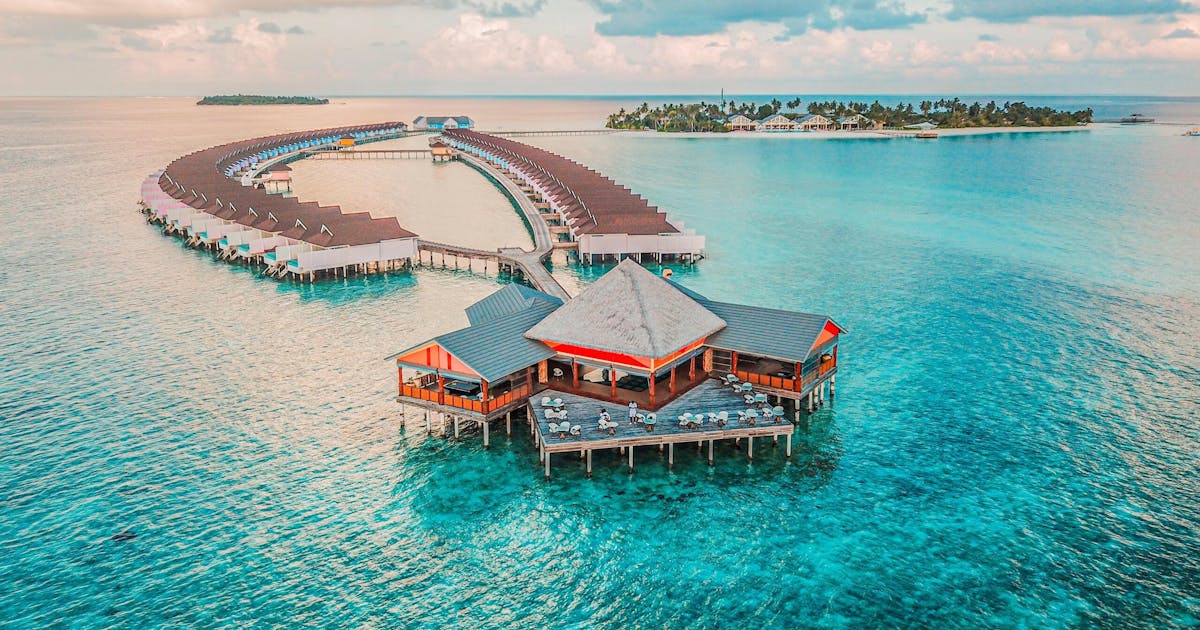
Maldives Visa for Indians: Visa on Arrival & Requirements
Apr 26, 2024Maldives Visa for Indians
Plan your Maldives trip with ease. Find out everything about the Maldives visa for Indians, from the required documents to the on arrival application process.

Bhutan Visa for Indians: Visa Free Entry & Travel Requirements
Apr 26, 2024Bhutan Visa for Indians
Explore Bhutan without the visa hassle: A guide for Indians on visa-free entry, the Bhutan entry permit, and what you need to know for a smooth travel experience.
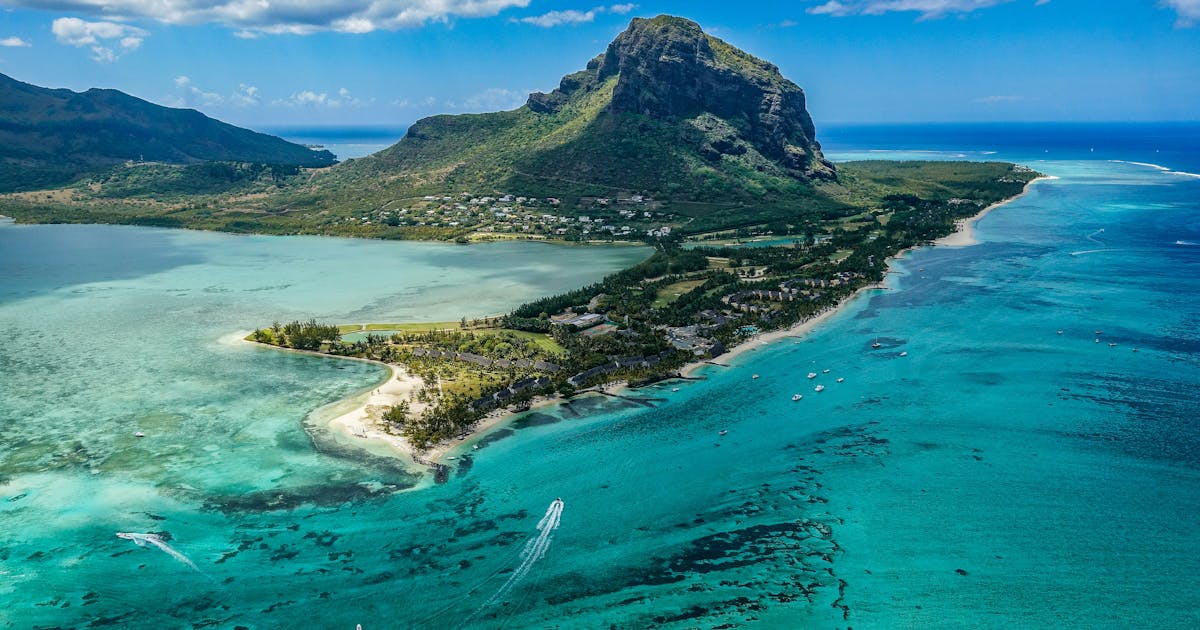
Mauritius Visa for Indians: Visa on Arrival & Requirements
Apr 26, 2024Mauritius Visa For Indians
Simplify your Mauritius journey with our ultimate guide on the Mauritius visa for Indians. Learn about the visa requirements, visa-on-arrival process, fees, and more.

Nepal Visa for Indians: Visa Free Entry & Travel Requirements
Apr 26, 2024Nepal Visa For Indians
Explore Nepal without the visa hassle as an Indian traveler by understanding the visa-free entry and documents required to enter Nepal from India.
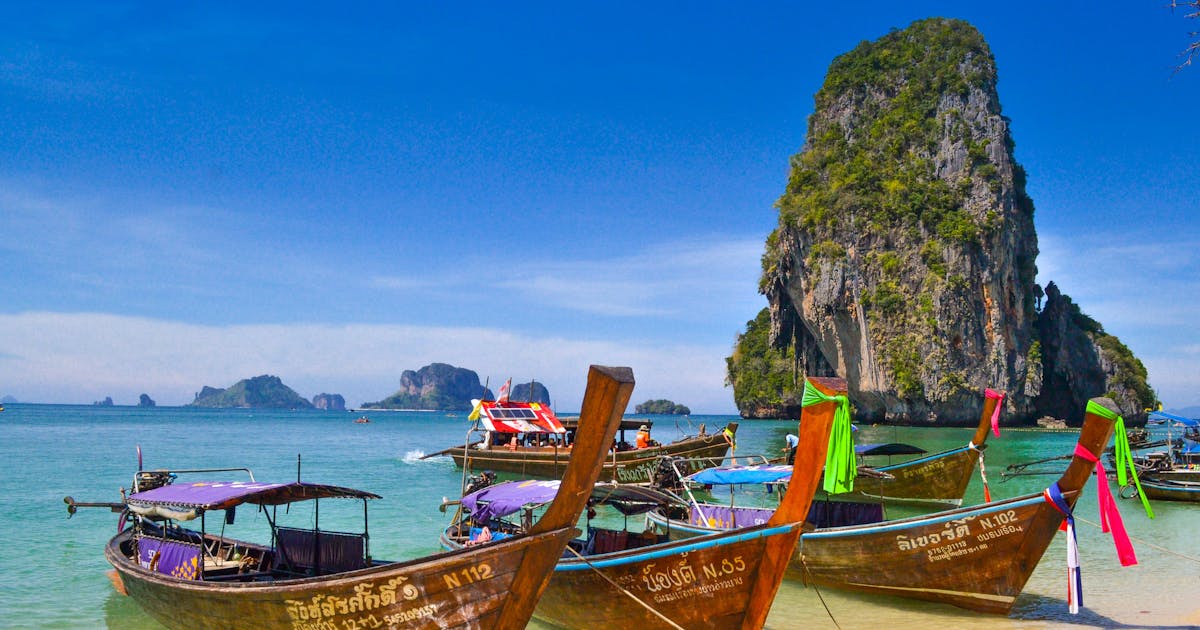
Thailand E-Visa on Arrival for Indians: Fee, Requirements & Process
Apr 26, 2024Thailand E-Visa on Arrival
Get your Thailand visa for Indian travellers with ease. Learn about processing times, required documents, fees, validity, and tips for hassle-free entry in Thailand.

Seychelles Visa for Indians: eTA Requirements & Application
Apr 26, 2024Seychelles Visa For Indians
Your complete guide to Seychelles visa for Indians: Learn about requirements, costs, and travel tips for an unforgettable experience.